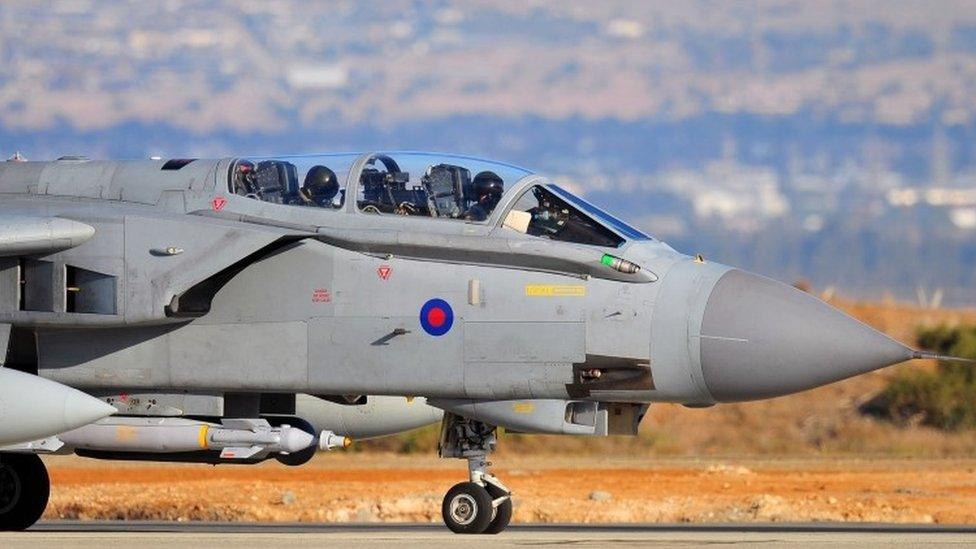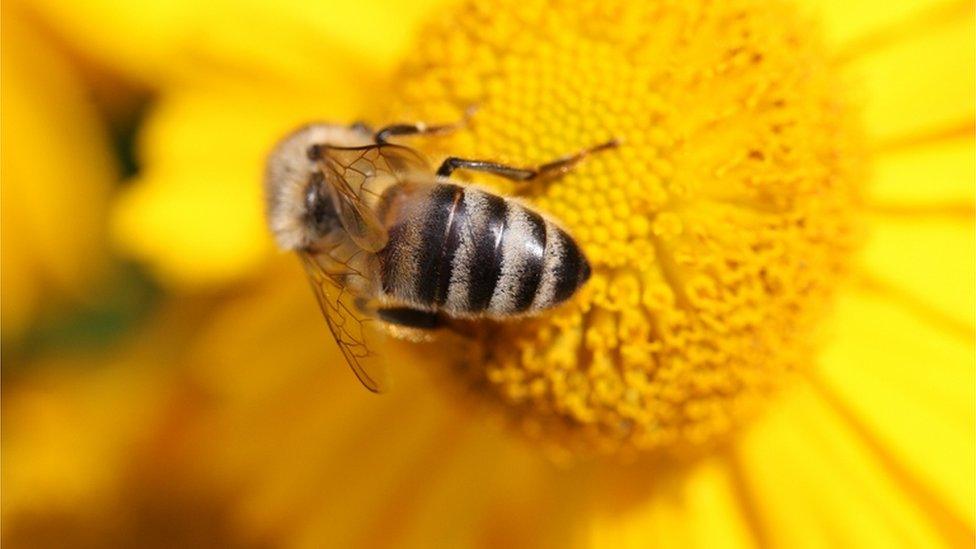The week ahead in Westminster
- Published

After the vote on airstrikes in Syria it is scheduled to be a less dramatic week in the Commons
After last week's dramas the Parliamentary agenda suggests a quieter week lies ahead, but unscheduled events like statements or urgent questions could mean military action in Syria is never far from centre stage in Westminster.
There is already speculation that the government might seek to push through a vote on renewing the Trident nuclear deterrent, if only to keep Labour off-balance. It would be hard to do that without notice, but the next business statement might well flag up an impending vote, perhaps before Christmas.
Watch out, too, for a euro-statement or urgent question at some point this week; the President of the EU Commission, Donald Tusk, is to write to all EU leaders outlining his assessment of Britain's demands for EU reform, and there is certain to be considerable interest in his verdict.
Here's my rundown of the week ahead:
Monday December 7th
The Commons meets at 14:30 GMT for work and pensions questions and when they conclude there is always an excellent chance of a ministerial statement or urgent question.
The day's legislative business is to polish off the report and third reading of the Cities and Local Government Devolution Bill. Report stage offers a number of contentious amendments from critics of plans to create big city metro-mayors who will preside over strategic super-authorities covering several existing councils.
New Clause 8, proposed by 1922 committee chair, Graham Brady, former cabinet minister Cheryl Gillan and influential backbencher Nigel Evans aims to create a "cooling off period" for the transfer of any power to a combined authority. If a member council in a combined authority requests that a power is returned to it in the year after its local elections, then the secretary of state would have to ensure that happened.
Another new clause, NC9, requires that member councils in a combined authority are consulted on any major healthcare reorganisation in their area, not just the combined authority being consulted, and another would allow a constituent part of a combined authority to leave on "fair terms" without the combined authority being dissolved.
Then there is an amendment (no 2) from an impressive list of Tory awkward squaddies (including Graham Brady, again, Jacob Rees-Mogg, Peter Bone, Dr Sarah Wollaston, and former cabinet minister David Jones). It would require that elected mayors would be introduced only if approved by a referendum, most cities rejected mayors in referendums held under the coalition.

In Westminster Hall, MPs will debate an e-petition "Don't kill our bees!" It demands an immediate halt to the use of Neonicotinoids, a type of pesticide in agricultural use that controls pests such as aphids and grubs. Opponents claim it gets into the pollen rendering it deadly to bees and other pollinators. Neonicotinoids are banned in several countries. The government says it is committed to protecting bees and maintaining a range of pollinators, but its decisions on pesticides are based on recommendations from independent experts who have studied the evidence.
In the Lords (14.30 GMT) peers will nod through the third reading of the National Insurance Contributions (Rate Ceilings) Bill. The main business is the Welfare Reform and Work Bill, committee (day 1), key issues include those on limiting child tax credit and Universal Credit to two children and reporting obligations on child poverty.
That is followed by a short debate on defence and security cooperation with UK European partners in NATO and the EU, led by the Liberal Democrat former Foreign Office minister, Lord Wallace of Saltaire,
Tuesday December 8th
The Commons meets at 11.30 GMT for justice questions.
One possible subject for a ministerial statement is the publication of a review in to how the world can tackle overuse of antibiotics in livestock to fight the rise of superbugs. David Cameron tasked Lord Jim O'Neill to investigate the issue.
Reflecting his contribution to the Syria debate, the Liberal Democrat Leader Tim Farron presents a bill on asylum for unaccompanied children from places like Syria, Iraq, Afghanistan and Eritrea, who have been displaced by conflict.
Then, MPs have up to four hours to consider amendments made in the Lords to the European Union Referendum Bill, will they strike down the amendment which called for "Votes at 16?" And what about the 10 week obligation for the foreign secretary to provide a report on renegotiation terms to the House?
The next item is a motion from the Home Office minister, James Brokenshire calling for Britain to opt into the European Prüm agreement, external to tackle serious and organised crime through shared DNA and fingerprint databases.
In Westminster Hall the big debates are Ian Austin's on access to medicines for people with cystic fibrosis and other rare diseases (09.30 - 11 GMT) and Caroline Spelman's on marriage registration certificates (14.30 - 16:00 GMT)
In the Lords (14:30 GMT) two new peers take their seats: Baroness Fall (Kate Fall, the deputy chief of staff for David Cameron), and Baroness Primarolo (former Deputy Speaker of the Commons and long-serving Labour minister, Dawn Primarolo).
The main legislating is detailed consideration of the Scotland Bill at committee stage, the key issues are; constitutional, the Crown Estate and quality in the public sector.
Wednesday December 9th
The Commons opens (11.30 GMT) with Cabinet Office questions, held over from Wednesday to make time for the Syria debate. Prime minister's questions follows and then there is a bill from the DUP's Sammy Wilson on the Armed Forces Covenant (Implementation), the DUP take the view that the implementation of the military covenant is long overdue and that the Syrian intervention underlines the importance of doing the right thing by service personnel and their families.
The day's main business is a pair of Labour opposition debates, first on mental health, then on the effect of the autumn statement measures on women.
In Westminster Hall (09:30 GMT) the Conservative Henry Bellingham leads a debate on the exotic pets trade and Labour's Steve Rotheram leads a debate on the case of the Shrewsbury 24, building workers prosecuted in 1973 for picketing during the first ever national building workers strike.
Watch out, too for the debate on electoral integrity and absent votes (16:30 GMT) the Conservative Stewart Jackson will raise concerns about the abuse of postal voting. In the wake of the Oldham by-election he has echoed UKIP concerns about "postal voting on demand" which he thinks should now be scrapped.
In the Lords (15:00 GMT) the main event is the second day of detailed committee stage consideration of the Welfare Reform and Work Bill. This is where peers probe the government's intentions and don't usually force anything to a vote. But it sets up any subsequent attempts to amend at the later report stage. The key issues, this time, are employment and support allowance, work related requirements on Universal Credit, full-employment reporting, apprenticeships, and troubled families.
The dinner break business is a debate on the Prum proposals (see Commons, Tuesday).
Thursday December 10th
The Commons meets at 09.30 GMT for transport questions , followed by the weekly Commons business statement from the leader of the House.
The main debates are on two subjects chosen by the Backbench Business Committee, first the Transatlantic Trade and Investment Partnership (TTIP) important trade negotiations and then on international human rights day.
In Westminster Hall (13:30 GMT) there is a debate on the protection of ancient woodland and trees
In the Lords (11:00 GMT) two veteran Labour ministers, Baroness (Tessa) Jowell and Lord (Alistair) Darling take their seats.
The first debate is on the future of legal aid, opened by Lord Bach, who's leading a Labour Party review to analyse the impact of changes made under the coalition and the current government, this is one of those occasions where the massed ranks of house of Lords lawyers can make life very uncomfortable for the government.
The second debate is on the quality and viability of the residential care sector in the light of the delay in the introduction of the cap on care costs. It is led by Labour's Baroness Wheeler.
In-between is a lunch-time debate on the rise in religious conflicts and violence, in the light of the recent visit by Pope Francis to the Central African Republic.
Friday December 11th
The Commons is not sitting on Friday but the Lords have a number of peer's bills to consider.
First Labour's Lord Faulkner of Worcester's Accessible Sports Grounds Bill. Followed by Crossbencher Baroness Howe's Online Safety Bill. Liberal Democrat, Lord Purvis of Tweed has a Constitutional Convention Bill and finally there is a bill from another Crossbencher, Baroness Cox with her Arbitration and Mediation Services (Equality) Bill.
To add to the day's agenda there is an extra-special treat in the shape of a Foreign Affairs committee hearing (10.30 GMT) on 'Libya: examination of intervention and collapse and the UK's future policy options', which will question the Labour former Prime Minister, Tony Blair.
- Published3 December 2015